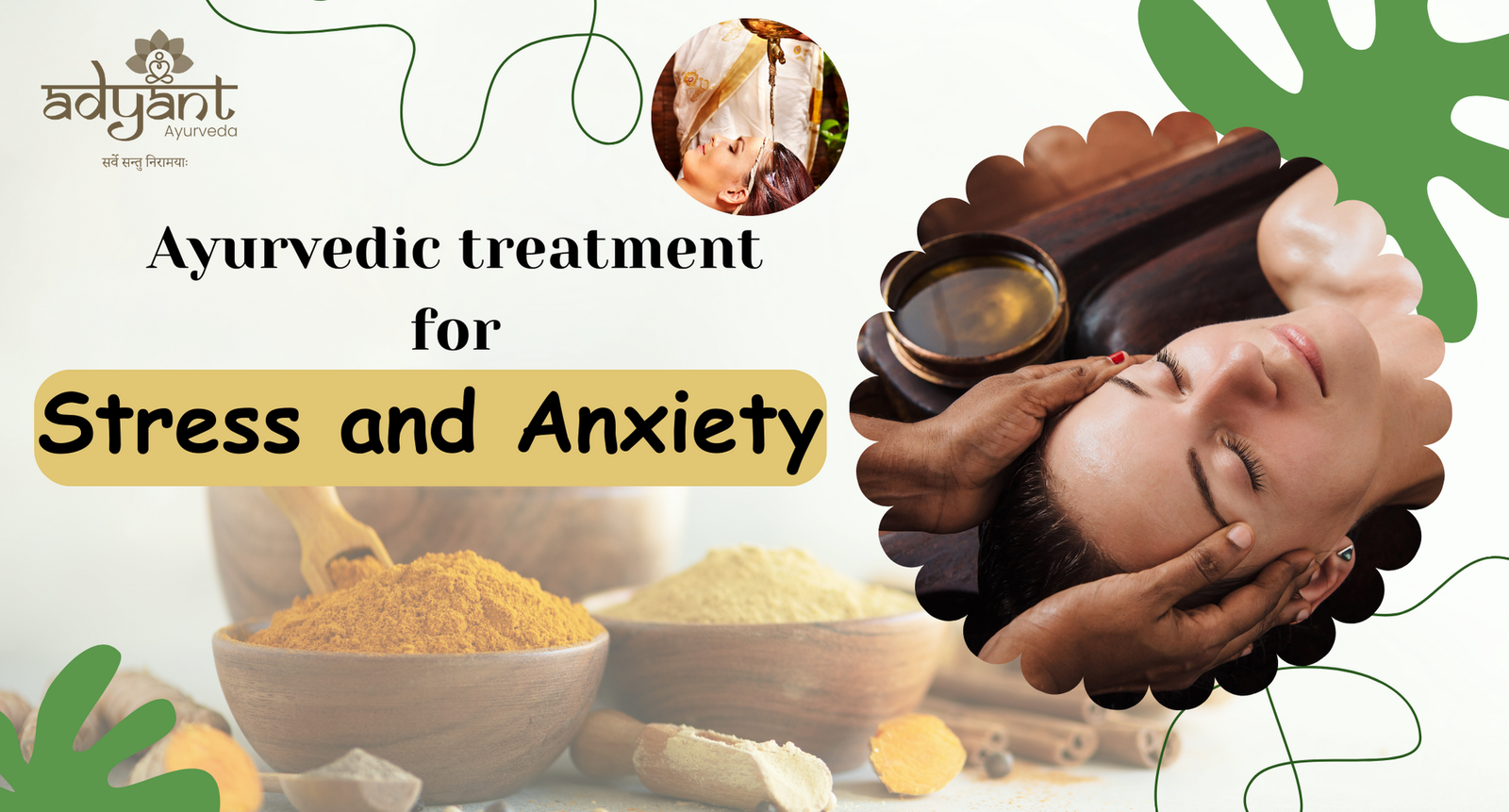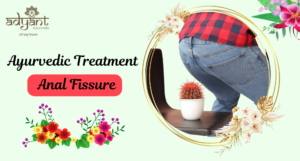
Ayurvedic Treatment for Anxiety and Stress: In today’s fast-paced world, stress and anxiety have become unwelcome companions for many of us. The constant demands of work, family, and social obligations can leave us feeling overwhelmed, drained, and disconnected from our inner selves. While conventional approaches often rely on medication or talk therapy, the ancient Indian system of Ayurveda offers a holistic and time-tested path to managing stress and anxiety from the roots.
Ayurveda, which translates to “the science of life,” is a comprehensive system of medicine that emphasizes the importance of balance and harmony among the body, mind, and spirit.
Click Here: For Free Consultation
According to Ayurvedic principles, stress and anxiety arise from an imbalance in the doshas – the three fundamental energies that govern our physical, mental, and emotional well-being. Ayurvedic treatment for anxiety and stress involves balancing doshas (energies).
By understanding the underlying causes of stress and anxiety through the lens of Ayurveda, we can take proactive steps to restore equilibrium and cultivate a sense of calm and resilience. Here’s how Ayurvedic wisdom can help you navigate the turbulent waters of stress and anxiety:
Ayurvedic Treatment for Anxiety and Stress: Identifying and Addressing Doshas Imbalances
In Ayurveda, stress and anxiety are often associated with an aggravation of the Vata dosha, which governs movement and communication within the body and mind. When Vata becomes imbalanced, it can manifest as restlessness, worry, insomnia, and an overactive mind.
However, in the ayurvedic treatment for Anxiety and Stress it’s important to recognize that each individual’s experience of stress and anxiety may be influenced by imbalances in the other doshas as well. For instance, an excess of Pitta (the fire element) can contribute to irritability, anger, and a tendency towards perfectionism, while an imbalance in Kapha (the earth and water elements) may lead to lethargy, emotional dullness, and a resistance to change.
An Ayurvedic practitioner will assess your unique constitution (prakriti) and current state of imbalance (vikriti) through a comprehensive evaluation that includes physical, mental, and emotional assessments. Based on this understanding, they will recommend personalized ayurvedic treatment for Anxiety and Stress and lifestyle modifications to restore harmony to the doshas and alleviate the symptoms of stress and anxiety.
You May Also Like: Ayurvedic Doshas: Vata, Pitta, Kapha
Ayurvedic Treatment for Anxiety and Stress: Dietary Recommendations
Food plays a vital role in Ayurvedic healing, as it is believed to directly influence our physical, mental, and emotional well-being. Ayurvedic practitioners may recommend specific dietary adjustments in ayurvedic treatment for Anxiety and Stress to pacify the aggravated doshas and promote a sense of calm and grounding.
For individuals with a Vata imbalance, warm, nourishing, and well-cooked foods are often recommended, as they help to ground and stabilize the erratic energy of Vata. Examples include root vegetables, whole grains, ghee (clarified butter), and warming spices like ginger, cinnamon, and cardamom.
If Pitta is the predominant imbalance, cooling and soothing foods can help to temper the fiery nature of this dosha. This may include fresh fruits and vegetables, coconut water, and herbs like cilantro, fennel, and coriander.
For those with a Kapha imbalance, light, warm, and easily digestible foods are often advised to stimulate digestion and promote a sense of lightness and clarity. Examples include bitter greens, legumes, and pungent spices like black pepper and cayenne.
Adyant Ayurveda provide the best ayurvedic treatment for Anxiety and Stress by aligning our diet with our individual constitutions and current state of imbalance. We can support the body’s natural healing processes and cultivate a sense of inner calm and resilience.
Herbal Remedies for Stress and Anxiety Relief
In ayurvedic treatment for Anxiety and Stress Ayurveda offers a vast pharmacopoeia of herbs and natural remedies that can help to alleviate the symptoms of stress and anxiety while addressing the underlying imbalances. These herbal formulations are carefully crafted to target specific doshas and promote overall well-being.
For example, adaptogens like Ashwagandha (Withania somnifera) and Brahmi (Bacopa monnieri) are renowned for their ability to support the body’s stress response and promote a sense of calm and mental clarity. In ayurvedic treatment for Anxiety and Stress these herbs help to nourish and rejuvenate the nervous system. Also reducing the damaging effects of chronic stress and anxiety.
Other herbs like Jatamansi (Nardostachys jatamansi) and Shankhapushpi (Convolvulus pluricaulis) are prized for their calming and sedative properties, helping to reduce anxiety, restlessness, and insomnia.
In addition to these targeted herbs, Ayurvedic practitioners may also recommend polyherbal formulations, known as rasayanas, which are designed to promote overall rejuvenation and balance within the body and mind.
Learn More: Panchakarma Treatment
Panchakarma: Detoxification for Emotional Cleansing
Panchakarma, the ancient Ayurvedic system of detoxification, plays a crucial role in ayurvedic treatment for Anxiety and Stress. According to Ayurvedic principles, “the accumulation of toxins (ama) in the body and mind can contribute to imbalances in the doshas, leading to physical and emotional distress.“
Panchakarma therapies, such as Virechana (purgation), Vasti (medicated enema), and Nasya (nasal administration of medicated oils), work to eliminate these accumulated toxins and restore balance to the body and mind.
One particularly powerful therapy for ayurvedic treatment for Anxiety and Stress is Shirodhara, a relaxing and rejuvenating treatment in which warm medicated oil is gently poured over the forehead. This therapy is believed to calm the mind, reduce mental fatigue, and promote a deep state of relaxation, making it an effective tool for managing stress and anxiety.
By removing toxins and restoring balance to the doshas, Panchakarma therapies create a foundation for optimal physical, mental, and emotional well-being, helping to alleviate the underlying causes of stress and anxiety.
Learn More: Shirodhara Therapy
Lifestyle and Mind-Body Practices
Ayurveda recognizes that our physical and emotional well-being are deeply intertwined with our lifestyle choices and spiritual practices. As such, Ayurvedic practitioners may recommend while ayurvedic treatment for Anxiety and Stress a range of mind-body practices to complement dietary and herbal interventions in managing stress and anxiety.
Yoga and meditation are at the heart of Ayurvedic lifestyle recommendations. These ancient practices help to cultivate awareness, presence, and a sense of inner calm, counteracting the restlessness and worry that often accompany stress and anxiety.
Pranayama (breathing exercises) are also highly regarded in Ayurveda, as they help to regulate the flow of prana (life force) and promote balance within the mind and body. Techniques like Nadi Shodhana (alternate nostril breathing) and Bhramari (humming bee breath) can be particularly effective in reducing anxiety and promoting a sense of grounding.
Additionally, ayurvedic treatment for Anxiety and Stress emphasizes the importance of daily routines (dinacharya) and seasonal routines (ritucharya), which can help to establish a sense of structure and stability in our lives, reducing the chaos and uncertainty that can contribute to stress and anxiety.
By integrating these mind-body practices into our daily lives, we can cultivate a deeper sense of self-awareness, resilience, and emotional balance, creating a strong foundation for managing stress and anxiety in a holistic and sustainable manner.
Ayurvedic Treatment for Anxiety and Stress: Conclusion
Stress and anxiety are pervasive challenges in our modern world, but the ancient wisdom of Ayurveda offers a comprehensive and time-tested ayurvedic treatment for Anxiety and Stress. By identifying and addressing dosha imbalances, incorporating dietary and herbal remedies, undergoing detoxification therapies, and embracing lifestyle and mind-body practices, we can cultivate a sense of calm, resilience, and overall well-being.
Ayurveda empowers us to take an active role in our healing journey, recognizing that true health and vitality arise from a harmonious balance of the body, mind, and spirit. By aligning our lives with the principles of Ayurveda, we can navigate the storms of stress and anxiety with grace, clarity, and a deep connection to our authentic selves.
Remember, the path to reducing stress and anxiety is a journey. And Ayurveda offers a compassionate and personalized approach for ayurvedic treatment for Anxiety and Stress to support you every step of the way. Embrace the wisdom of this ancient system, and allow it to guide you towards a life of greater peace, balance, and emotional well-being.
Read Other Related Blogs:





